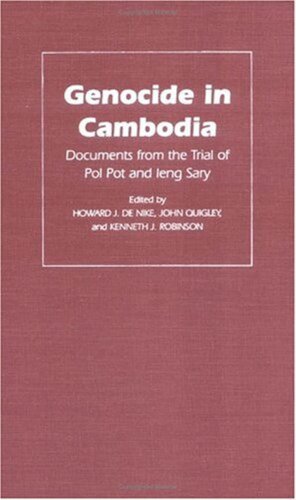

Most ebook files are in PDF format, so you can easily read them using various software such as Foxit Reader or directly on the Google Chrome browser.
Some ebook files are released by publishers in other formats such as .awz, .mobi, .epub, .fb2, etc. You may need to install specific software to read these formats on mobile/PC, such as Calibre.
Please read the tutorial at this link: https://ebookbell.com/faq
We offer FREE conversion to the popular formats you request; however, this may take some time. Therefore, right after payment, please email us, and we will try to provide the service as quickly as possible.
For some exceptional file formats or broken links (if any), please refrain from opening any disputes. Instead, email us first, and we will try to assist within a maximum of 6 hours.
EbookBell Team

5.0
110 reviewsThe Khmer Rouge held power in Cambodia from 1975 to 1979 and aggressively pursued a policy of radical social reform that resulted in the deaths of hundreds of thousands of Cambodians through mass executions and physical privation. In January 1979, the government was overthrown by former Khmer Rouge functionaries, with substantial backing from the army of Vietnam. In August of that year a special court, the People's Revolutionary Tribunal, was constituted to try two of the Khmer Rouge government's most powerful leaders, Pol Pot and Ieng Sary. The charge against them was genocide as it was defined in the United Nation's genocide convention of 1948. At the time, both men were in the Cambodian jungle leading the Khmer Rouge in a struggle to regain power; they were, therefore, tried in absentia.
Genocide in Cambodia assembles documents from this historic trial and contains extensive reports from the People's Revolutionary Tribunal. The book opens with essays that discuss the nature of the primary documents, and places the trial in its historical, legal, and political context. The documents are divided into three parts: those relating to the establishment of the tribunal; those used as evidence, including statements of witnesses, investigative reports of mass grave sites, expert opinions on the social and cultural impact of the actions of Pol Pot and Ieng Sary, and accounts from the foreign press; and finally the record of the trial, beginning with the prosecutor's indictment and ending with the concluding speeches by the attorneys for the defense and prosecution.
The trial of Pol Pot and Ieng Sary was the world's first genocide trial based on United Nations's policy as well as the first trial of a head of government on a human rights-related charge. This documentary record is significant for the history of Cambodia, and it will be of the highest importance as well to the international legal and human rights communities.